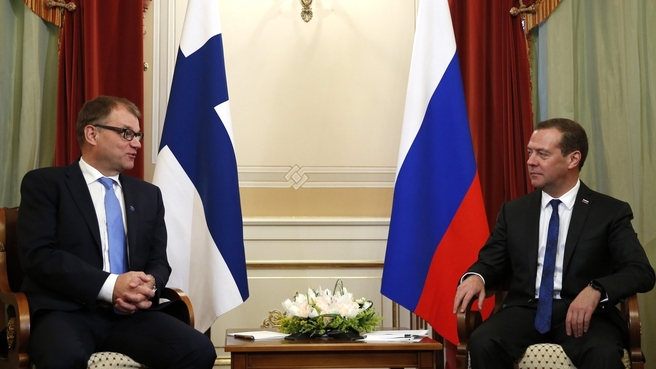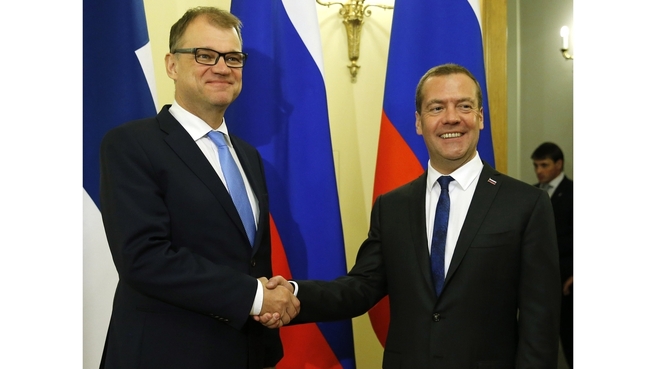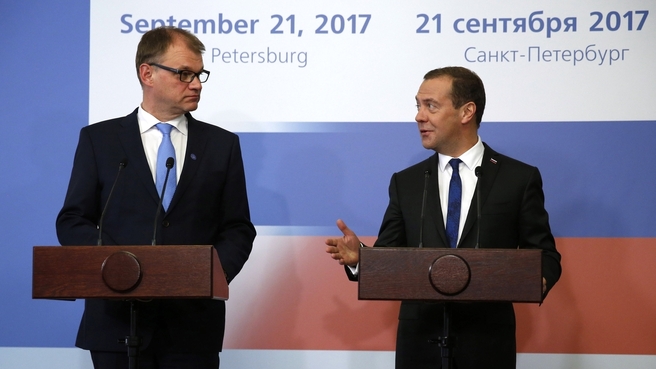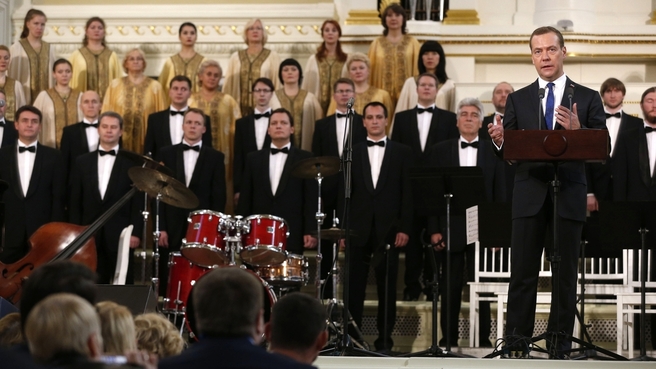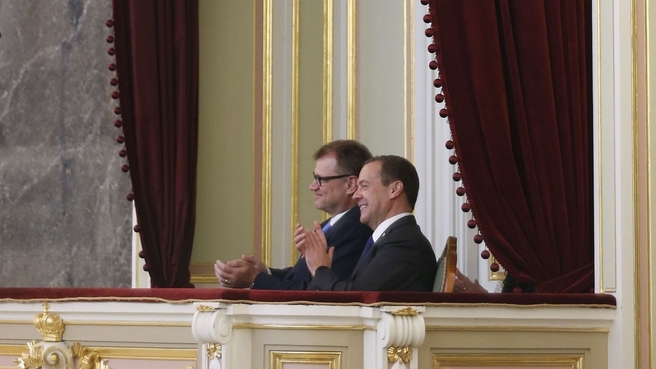Dmitry Medvedev holds talks with Prime Minister of Finland Juha Sipila.
Dmitry Medvedev’s conversation with Prime Minister of Finland Juha Sipila
News conference of Dmitry Medvedev and Juha Sipila after the talks
Dmitry Medvedev’s conversation with Prime Minister of Finland Juha Sipila
Conversation with Prime Minister of Finland Juha Sipila
Excerpts from the transcript:
Dmitry Medvedev: It is a pleasure to meet with you again to discuss current bilateral relations, and of course international issues, as well as attend our cultural forum.
I hope that we will have productive talks today.
Juha Sipila: This is our third meeting. This time we meet as part of the centenary celebration of Finland’s independence.
We also have an opportunity to discuss a number of positive economic developments, such as growing exports, imports.
News conference of Dmitry Medvedev and Juha Sipila after the talks
Excerpts from the transcript:
Dmitry Medvedev: This is already our third meeting. It is taking place in the year of the 100th anniversary of Finland’s independence.
We have focused mostly on trade and economic ties. They have started to improve recently. The decline in trade seen in 2015 and 2016 is over. Trade has increased by almost 50 percent in the first seven months of this year. Russia is Finland’s third largest trade partner now.
We talked about the construction of the Hanhikivi 1 nuclear power plant with Russia’s participation and design. We also spoke about Nord Stream 2, construction of which should start in the first quarter of next year, and many other recent investments. I mentioned, in particular, the company Fortum, which completed a large investment programme to build and upgrade energy capacities in Western Siberia and is now developing wind power in cooperation with Rosnano.
I am pleased to say that this is not just Finnish investments but also investments by our companies in the Finnish economy.
Juha Sipila: The dialogue between our countries continues as a natural part of our neighbourhood. President Putin’s visit to Savonlinna last summer was part of our jubilee year.
Today my opposite number and I noted that since our last meeting Russia has indeed become the third biggest trade partner of Finland, the number of border crossings, visa applications and Russian tourists in Finland in terms of nights spent has increased by 19 percent.
Finnish companies in Russia are operating on a long-term basis. Even at difficult times the majority of Finnish companies have stayed in Russia. The total amount of Finnish investments in Russia is about 12 billion euros and new projects are being discussed.
We have discussed the Krasny Bor toxic waste range and there is a firm commitment to solve the problem. Finnish companies can provide the knowhow for this project.
Another very important environmental issue is soot. The members of the Arctic Council have set a target for limiting and reducing black carbon (soot) emissions.
We have discussed cooperation in nuclear energy between Fennovoima and Rosatom. It is very important for Finland to see this project develop positively and meet all the criteria set by the official agencies.
The Ukrainian conflict has an impact on the relations between the European Union and Russia; relations depend on the conflict’s resolution. In spite of the sanctions, Russia and the European Union are neighbours, and cooperation in many sectors is in the interests of both sides. Regular dialogue, in any case, plays a very important role.
We have also discussed the situation in North Korea. The international community should act in concert here.
I would like to mention the latest Levada Centre poll on the attitudes of Russians towards Finland. According to that poll, more than two-thirds of Russians have a positive or very positive attitude to Finland.
The main event of this jubilee year on Russian territory is the Russian-Finnish Cultural Forum which opens today.
Today I will also visit Finland House in St Petersburg where I will meet with representatives of the Finnish companies working in St Petersburg.
The acquisition of Finland House, which was agreed
in Oulu, is proceeding thanks to good cooperation. We have very ambitious plans
for the development of Finland House’s activities. It will become a door to
Finland for residents of St Petersburg, and a door for Finnish citizens to St Petersburg
and the Russian North-West as a whole.
Question: My question concerns Nord Stream 2. What do you think about the implementation of this project in the context of the European Commission’s plans to sign an additional agreement with Russia on the key principles for the pipeline’s operation? What is Finland’s position on this matter?
Juha Sipila: Finland’s position and approach to this matter are the same as before. To us, it is an environmental issue, which means that the project must receive all environmental permits. But it is also an economic issue in that Finland needs to grant permission on the use of its exclusive economic zone.
This issue has an economic aspect for the EU as well. But it concerns other countries rather than Finland, because we will not receive the products that will be transported via this pipeline, which other countries will buy. In other words, Finland’s position on this issue is neutral and focuses on environment-related matters.
Dmitry Medvedev: Our Finnish partners have taken a constructive stand on Nord Stream 2. In other words, they treat it as a regular commercial project that is based on pragmatic principles and as such must comply with environmental laws. They are not adding a political dimension to this project or the idea itself, but considering it as a commercial project.
The European Commission is only formulating its position, but we can tell already that it is not as pragmatic as Finland’s position. They intend to propose signing an additional agreement on Nord Stream 2. We believe that this is unacceptable and violates the principle of equality of investors, because such projects have been implemented in the past on the basis of bilateral contracts without any additional agreements. The talks are ongoing.
The United States wants to bury this project with various legal decisions, instruments and sanctions, and is clearly putting pressure on the EU to achieve this. The US administration and the Congress, which makes such decisions, are also trying to promote their own suppliers to replace Russia on this market. But the final decisions will be made by our EU partners, the European Commission and individual European governments, of course.
Question: This summer, Russia sent a note to Finland after the Finnish Consul General in St Petersburg had provided legal assistance to a person with dual Russian-Finnish citizenship. Does Russia think that the institute of dual citizenship can present a threat to Russia or have a negative impact on the situation?
I also have a question for Prime Minister Sipila. Do you think that the institute of dual citizenship should be abolished?
Juha Sipila: The legal aspects of the institute of dual citizenship are being discussed in Finland. I can only say now that the issue of dual citizenship concerns not only our eastern neighbour but all countries.
Dmitry Medvedev: The only information I have regarding the note you mentioned, or any other actions that have been taken in this regard, is that the issue concerns a violation of the procedure as it is stipulated in Russian legislation, and you should not draw any specific conclusions from this.
As for the institute of dual, or multiple, citizenship, the attitude to it differs from one country to another. Some countries recognise dual citizenship, while others reject it. It is a sovereign decision of each country.
